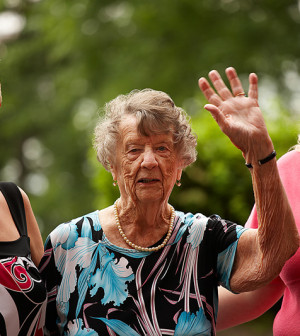- Could Your Grocery Store Meat Be Causing Recurring UTIs?
- Are You Making This Expensive Thermostat Error This Winter?
- Recognizing the Signs of Hypothyroidism
- 10 Strategies to Overcome Insomnia
- Could Artificial Sweeteners Be Aging the Brain Faster?
- Techniques for Soothing Your Nervous System
- Does the Water in Your House Smell Funny? Here’s Why
- Can a Daily Dose of Apple Cider Vinegar Actually Aid Weight Loss?
- 6 Health Beverages That Can Actually Spike Your Blood Sugar
- Treatment Options for Social Anxiety Disorder
Chasing, Tackling Suspects Raises Cops’ Odds of Sudden Death


Police face a higher risk of sudden cardiac death when they’re restraining or chasing suspects or engaging in altercations, compared to routine duties, according to new research.
The risk of sudden cardiac death rose during the most stressful times about 30 to 70 times higher than during non-stressful work, said Dr. Stefanos Kales, associate professor of environmental health at the Harvard School of Public Health.
In previous research, Kales and his colleagues had already found that firefighters had an increased risk of sudden cardiac death when putting out fires and being involved in other stressful situations. “Our hypothesis was, this same phenomenon could happen to police officers,” said Kales, who is also chief of occupational and environmental medicine at Cambridge Health Alliance.
His new study verified that it did.
However, Kales said, it’s crucial to keep the risk in perspective, as deaths happen relatively infrequently. In this study, the authors reported that there were 441 sudden cardiac deaths observed between 1984 and 2010.
“The absolute risk is small,” Kales said. The overall absolute risk is estimated at about two to four deaths per 10,000 officers per year, he explained.
Results from the study were published online Nov. 18 in BMJ.
Kales and his team looked at summaries of death of more than 4,500 police officers from U.S. law enforcement data sources from 1984 to 2010.
The 441 sudden cardiac death cases were most often linked with police being involved in restraining or chasing a suspect, or being involved in an altercation or doing physical training.
When the researchers compared the risk with non-emergency duties, the risk was 34 to 69 times higher during restraints or altercations, 32 to 51 times higher during pursuits, and about 20 times higher during physical training.
One take-home message, Kales said, is that police might pay attention to controlling their cardiac risk factors, such as maintaining a healthy weight, exercising regularly and keeping blood pressure and cholesterol at healthy levels.
While police departments generally have entry requirements for physical fitness, they may not have continuing requirements, Kales said. He suggested they should. “I think there should be adequate measures in place to ensure they are reasonably physically fit,” he said.
Dr. T. Jared Bunch, director of heart rhythm research at the Intermountain Medical Center in Murray, Utah, reviewed the research. “The general findings are not surprising,” he said, “but the magnitude of risk is higher than expected.”
Besides the on-the-job stress, he said, police often have to work swing shifts, and sleep is disrupted. “The combination of adrenalin, emotion and physical stress affects the heart greatly and can predispose people to abnormal heart rhythms, coronary artery disease and heart attacks,” Bunch said.
Police officers can minimize risk, however, Bunch said. “First, they have to try to separate their job from their personal lives and really attempt to get restorative sleep when they can. Next, they need to try to have social relationships that are strengthening in their lives. These supportive relationships are vital for long-term health.”
In addition, Bunch said, “with a difficult job it is often easy to not eat healthy.” So, he suggested preparing heart-healthy meals and including fruits and vegetables. He also advised eating out less often and packing food to take to work.
“Finally, exercise is vital for all of us,” Bunch stressed. “We all need 30 to 60 minutes of exercise daily. This will lower blood pressure, body inflammation and cholesterol. This will also condition the body for the physical intensity that may be required,” he concluded.
More information
To learn more about the effect of stress on the heart, visit the American Heart Association.
Source: HealthDay
Copyright © 2026 HealthDay. All rights reserved.










